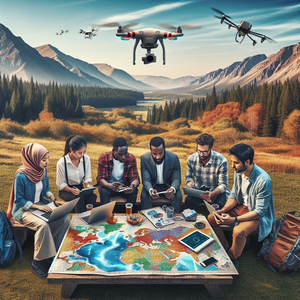GIS in Non-Traditional Sectors: Freelancing Opportunities Beyond the Norm

The agricultural landscape is experiencing a technological renaissance, with precision farming at the forefront. As farmers strive for greater efficiency and sustainability, GIS has emerged as a vital tool in their arsenal. Freelance GIS specialists can play a crucial role in this transformation by providing detailed analyses and mapping services. For example, a freelance GIS consultant may be commissioned to create comprehensive soil health maps that help farmers make informed decisions regarding crop rotation and irrigation strategies. By integrating satellite imagery with local weather data, these specialists can identify the optimal times for planting and harvesting, ultimately leading to enhanced yields and resource management. Additionally, GIS can assist in monitoring pest populations and recommending targeted interventions, thus minimizing chemical usage and promoting sustainable practices.
Case Study: Precision Agriculture
A notable freelance project involved working with a regional agricultural cooperative to develop an interactive GIS platform that allowed farmers to visualize crop health and yield predictions. By analyzing historical data and current crop conditions, the freelancer enabled farmers to make data-driven decisions that resulted in a 20% increase in overall productivity.
GIS Applications in Conservation
Conservation efforts are increasingly reliant on GIS technologies to monitor ecosystems, assess biodiversity, and analyze the effects of climate change. Non-profit organizations and governmental agencies are seeking out freelance GIS professionals to support their missions. Freelancers can engage in a range of projects, from mapping habitats and tracking endangered species to developing geospatial databases that inform conservation strategies. For instance, a GIS freelancer could assist a wildlife conservation group in analyzing migratory patterns of a threatened bird species using GPS tracking data and satellite imagery. By visualizing habitat changes over time, these professionals can provide critical insights for habitat restoration efforts.
Case Study: Habitat Mapping
In one project, a freelance GIS expert collaborated with a local conservation organization to create a detailed habitat map for a coastal ecosystem. By analyzing land use, elevation, and vegetation cover, the freelancer helped identify areas most at risk from rising sea levels, enabling the organization to prioritize conservation efforts and grant applications.
Public Health: A New Frontier for GIS Freelancers
The COVID-19 pandemic underscored the pivotal role of GIS in public health, highlighting its capacity to track disease outbreaks and analyze health disparities. As health departments and research institutions increasingly rely on location-based data, freelance opportunities in this sector are on the rise. From mapping the spread of infectious diseases to evaluating healthcare access in underserved communities, GIS freelancers can make significant contributions to public health initiatives. For example, a freelance GIS analyst may be tasked with visualizing vaccination rates across different demographics, thereby aiding in the equitable distribution of healthcare resources.
Case Study: Vaccine Distribution Planning
A striking example of GIS application in public health was a project focused on vaccine distribution during the pandemic. A GIS freelancer worked with a health department to create a dynamic mapping tool that identified areas with low vaccination rates and high-risk populations. This tool was instrumental in strategizing outreach efforts, ultimately leading to improved vaccination coverage in vulnerable communities.
How to Tap into These Niche Markets
1. Networking and Collaboration: Engage with industry-specific groups and attend conferences focused on agriculture, conservation, and public health to establish connections with potential clients. Networking can lead to valuable referrals and collaborative projects. 2. Developing Specialized Skills: Pursue additional certifications or training in areas relevant to your target sectors, such as remote sensing for agriculture or health informatics for public health. Specialization increases your marketability and appeal to potential clients. 3. Showcasing Relevant Projects: Curate a portfolio that highlights your GIS work in non-traditional sectors. Include case studies that detail your contributions and the positive impact of your projects, thus enhancing your credibility. 4. Utilizing Online Platforms: Explore online freelance platforms that cater to GIS-related projects in agriculture, conservation, or public health. Websites like Upwork or Freelancer can connect you with clients seeking GIS expertise in these niche fields.
The GIS landscape is evolving rapidly, and freelancers who venture beyond traditional applications are poised to uncover a wealth of opportunities in non-traditional sectors. By harnessing the growing demand for GIS expertise in agriculture, conservation, and public health, GIS professionals can diversify their client base and engage in meaningful work that addresses some of society’s most pressing challenges. As the GIS freelancing landscape expands, those who are proactive in exploring these unconventional paths can carve out a unique niche that aligns with their passions and skills. The future of GIS freelancing is not only promising but also vital for fostering sustainable practices and improving public welfare.
Precision Agriculture GIS Specialist
Agricultural cooperatives, agritech companies, and research institutions
Core Responsibilities
Develop and implement GIS-based solutions for precision agriculture, including soil health analysis and crop monitoring.
Integrate satellite imagery and weather data to advise farmers on optimal planting and harvesting times.
Conduct spatial analyses to identify pest populations and recommend targeted pest management strategies.
Required Skills
Proficiency in GIS software (e.g., ArcGIS, QGIS) and remote sensing tools.
Strong understanding of agricultural practices and sustainability concepts.
Experience with data visualization and statistical analysis.
Conservation GIS Analyst
Non-profit organizations, government environmental agencies, and research institutes
Core Responsibilities
Create detailed habitat and biodiversity maps to support conservation planning and initiatives.
Analyze ecological data to assess the impact of climate change on various ecosystems.
Collaborate with NGOs to track endangered species and inform habitat restoration projects.
Required Skills
Expertise in GIS and spatial analysis, particularly in ecological and environmental contexts.
Familiarity with wildlife tracking technologies and biodiversity assessment methods.
Strong communication skills for presenting findings to stakeholders.
Public Health GIS Analyst
Health departments, research institutions, and public health NGOs
Core Responsibilities
Utilize GIS tools to analyze health data, track disease outbreaks, and assess health disparities in communities.
Develop mapping solutions for vaccine distribution and healthcare access planning.
Collaborate with public health officials to visualize and communicate key health metrics.
Required Skills
Experience with health informatics and public health data analysis.
Proficiency in GIS software and statistical tools for health-related applications.
Understanding of health equity and social determinants of health.
Environmental Data Scientist with GIS Focus
Environmental consulting firms, governmental agencies, and research organizations
Core Responsibilities
Analyze environmental data using GIS to assess impacts and support policy decisions.
Develop predictive models to forecast environmental changes and inform management strategies.
Create interactive dashboards and visualizations for stakeholders to understand environmental trends.
Required Skills
Strong background in data science, statistics, and programming languages (e.g., Python, R).
Expertise in GIS technology and environmental modeling techniques.
Excellent problem-solving skills and the ability to work with large datasets.
Agricultural Remote Sensing Consultant
Agritech companies, research institutions, and environmental consulting firms
Core Responsibilities
Conduct remote sensing analyses to monitor crop health and agricultural productivity using satellite data.
Provide actionable insights and recommendations based on remote sensing findings for improved farm management.
Collaborate with farmers and agricultural stakeholders to implement technology-driven solutions.
Required Skills
Expertise in remote sensing technologies and GIS software.
Knowledge of agricultural practices and the ability to interpret remote sensing data effectively.
Strong analytical skills with experience in machine learning applications for agriculture.


